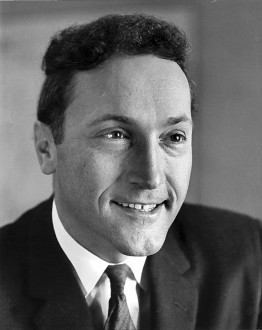Richard Schweiker (Richard Schultz Schweiker)

In 1960, Richard Schweiker was elected to the U.S. House of Representatives from Pennsylvania’s 13th congressional district. At the time, the Montgomery County-based district included Schweiker’s home town of Norristown and several affluent suburban communities in the Philadelphia Main Line. A moderate to liberal Republican, he defeated conservative incumbent John Lafore in the Republican primary. In the general election, he defeated Democrat Warren Ballard, a law professor at Temple University, by a margin of 62%-38%. He was elected to three more terms, never receiving less than 59% of the vote. During his tenure in the House, Schweiker served on the Armed Services Committee and the Government Operations Committee. He sponsored legislation, signed into law in 1965, that provided cash awards to military service personnel for cost-cutting ideas. He also supported civil rights legislation, the creation of Medicare, increases in Social Security, and federal rent subsidies. He considered running for Governor of Pennsylvania in 1966, but state Republican leaders persuaded him against it.
In 1968, Richard Schweiker was elected to the U.S. Senate, defeating two-term Democratic incumbent Joe Clark by more than 280,000 votes. He was the only successful Republican statewide candidate in an election cycle that saw Hubert Humphrey win Pennsylvania by over 170,000 votes. Continuing his progressive reputation in the Senate, Schweiker opposed the Vietnam War and President Richard Nixon’s nominations of Clement Haynsworth and G. Harrold Carswell to the U.S. Supreme Court, and had an 89% rating from the liberal Americans for Democratic Action. However, he also supported school prayer, and opposed gun control and desegregation busing. During his tenure in the Senate, Richard Schweiker served as the ranking member on both the Labor and Human Resources Committee and the Labor, Health, and Human Services Appropriations Subcommittee. Schweiker was a pioneer in increasing government spending on diabetes mellitus research, through his authoring and sponsoring of the National Diabetes Mellitus Research and Education Act. This legislation, passed by Congress in 1974, established the National Commission on Diabetes to create a long-term plan to fight the disease. He was re-elected in 1974 after defeating his Democratic opponent, Pittsburgh mayor Pete Flaherty, despite the fact that the election cycle saw many Republican incumbents lose due to the Watergate scandal. He won 53% of the vote, the highest of any senator from Pennsylvania since 1946. He was the first Republican senator ever endorsed by the Pennsylvania AFL–CIO, and received 49% of the vote in heavily Democratic Philadelphia.
Richard Schweiker accepted President Reagan’s appointment as U.S. Secretary of Health and Human Services in January 1981. He held the position until he resigned in February 1983. During his tenure, he worked with Reagan and House Speaker Tip O’Neill to reform Social Security, put greater emphasis on preventive medicine, reduced Medicare and food stamp grants to the states, and restricted welfare eligibility. From 1983 to 1994, Schweiker served as president of the American Council of Life Insurance, now known as the American Council of Life Insurers. He retired and lived in McLean, Virginia. On July 31, 2015, Richard Schweiker died of complications from an infection at the AtlantiCare Regional Medical Center in Pomona, New Jersey.
Born
- June, 01, 1926
- USA
- Norristown, Pennsylvania
Died
- July, 31, 2015
- USA
- Pomona, New Jersey
Cemetery
- Central Schwenkfelder Garden Of Memories
- Worcester, Pennsylvania
- USA



